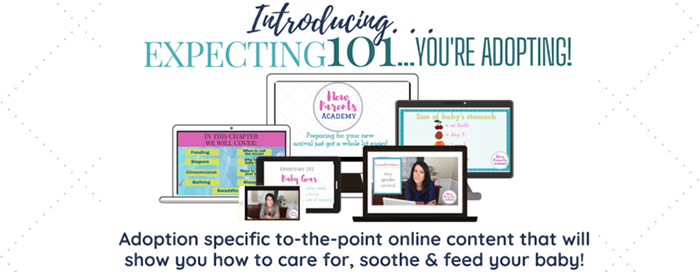
While every hopeful adoptive parent needs to complete paperwork and finish the steps required to adopt safely, it’s also worth spending some time preparing for life as new parents. Keep reading to discover what you can expect when bringing your adopted newborn home!
Sleep, what sleep?
In those first few weeks after they’re born, your baby will sleep a lot. They will awake when they’re hungry and need to be fed, which is often! Since babies have shorter sleep cycles than adults, you can expect your newborn to wake up two to four times a night.
Most babies settle into a routine of longer awake and sleep times when they’re about three months old. But until then, get ready to get up a few times a night to feed your baby.
Feeding Tips
Since you’ll be waking up every few hours during the day and night to feed your newborn, you might as well be comfortable. So it’s worth investing in a glider or rocking chair for you to sit in as you feed and burp your newborn.
A comfortable chair will help you relax during middle-of-the-night feedings. Typically, bottle-fed babies take anywhere from 20 to 40 minutes to eat. It will take about the same amount of time if you’re nursing.
Since newborns are prone to fall asleep while they’re eating, you might need to keep waking your baby up to finish eating. However, needing to wake your baby can increase the length of feedings out to an hour or longer. Feeding your baby can be a sweet experience, but when you’re exhausted, you may just want it to be over.
Instead, try to focus on the moment. For example, you might pray or sing a sweet song to your baby. To occupy your time, you could keep magazines or a book by the chair you’ll sit in to feed your baby. Or bring your phone and catch up on emails or social media.
It’s up to you what works best for you. But, most of all, remember that in a few short months, your precious baby will move out of the newborn stage. So enjoy it while you can!
Loneliness
A surprising aspect of parenting a newborn is feeling isolated and lonely. Most doctors recommend you wait until your newborn is several months old before taking them into a crowded public area like a mall, a movie theater, or a church.
Since the pandemic began, experts have suggested that new parents limit visitors, as a newborn still has a developing immune system. So, their bodies can’t fight off germs and infections as well as adults. It’s best to keep the visitors allowed in your home to your immediate family only.
But because of these restrictions, your social life will have to take a pause. So, many new parents miss seeing their friends and family for those first few months. But you can stay in touch through phone, text, a FaceTime call, or video chat.
Schedule a time to chat once a week with other parents who have been through the newborn stage. If the weather is nice, take your baby out for a walk in their stroller. The fresh air and sunshine will be good for both of you!
Don’t Beat Yourself Up
When you bring your newborn home, there are bound to be some significant adjustments. You might be expecting some adjustments, but others not so much. It can help to remember that you’re in a transitional stage right now. No matter how much you prepare for a newborn, there will always be surprises.
Try not to be too hard on yourself during this time. Eat well, take naps when you can, and get some exercise. Go for a run or walk in the park while your partner watches the baby. Becoming a parent is a significant life change, so permit yourself the space you need to adjust.
Accept Help
When people around you offer their help, take them up on their offer. Whether it’s going grocery shopping for you, preparing meals, or doing a couple of loads of laundry, say yes! There’s no need to take it all by yourself. Allow others the opportunity to show their love for you.
Expecting 101…You’re Adopting

Valerie created “Expecting 101… you’re adopting!” with adoptive families in mind. She wanted to create a newborn preparation course that doesn’t come with the pregnancy and postpartum tips offered in similar classes.
Valerie provides adopting parents a place to ready themselves with information to embrace the early days with their baby. Her experience with newborn care and new parent care has given her strategies on how you can bond with your baby, what baby supplies you need to have, and the essentials you’ll need for the first month or so until the adoption is official.
In the course “Expecting 101…you’re adopting!,” you’ll learn infant basics like how to swaddle and burp as well as answers the most-asked questions, like “Should we call our pediatrician about this?” and “How do we know if our baby is getting enough to eat?”
Plus, you have access for two years when you sign up for the course. So, you can watch it before you’re matched to learn what to expect in life with a newborn. Then, you can re-watch sections when you bring your baby home and have questions or need a refresher!
Parenting Your Newborn
You’ve waited for months to bring your sweet baby home. Of course, there will be adjustments as you start your new life as a parent. But, you’re not alone. Take a moment today to prepare for your adoption dream by signing up for “Expecting 101… you’re adopting!” The coupon code LIFETIME will reduce your course fee by 20%.
Linda Rotz, CWCM-S, CWCM-Trainer, ACC, is the Director of Adoption Services at Lifetime. Linda has worked in the field of adoption for 20 years within the child welfare/foster care system in Florida. She has degrees in Mass Communications and Human Development, and completed graduate studies in social work.
Due to her extensive expertise, Linda was called upon to write adoption procedures and training materials in Florida. She is certified as an Adoption Specialist, Child Welfare Case Manager Supervisor and Child Welfare Trainer in the state of Florida.
